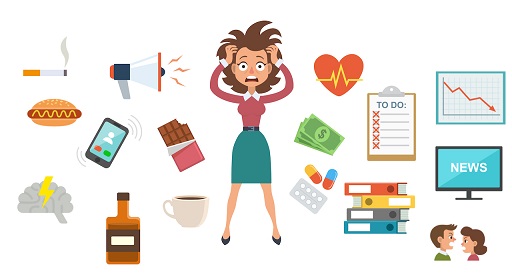Stress. A five-letter word that seems to be causing more and more issues for us every day. Stress itself is a normal reaction the body has when changes occur. It can respond to these changes physically, mentally, or emotionally.
A survey by the Mental Health Foundation (May 2018) found that almost three quarters of adults (74%) have at some point over the past year felt so stressed they felt overwhelmed or unable to cope.
This blog will try to help you deal with stress by asking:
- What is stress?
- What are the signs of stress?
- How do I avoid stress?
What is Stress?

At the most basic level, stress is our body’s response to pressures from a situation or life event. What contributes to stress can vary hugely from person to person and differs according to our social and economic circumstances, the environment we live in and our genetic makeup.
Some common features of things that can make us feel stress include experiencing something new or unexpected, something that threatens your feeling of self, or feeling you have little control over a situation.
The human body is designed to experience stress and react to it. Stress can be positive, keeping us alert, motivated, and ready to avoid danger. Stress becomes negative when a person faces continuous challenges without relief or relaxation between stressors.
Stress is a response to a threat in a situation, whereas anxiety is a reaction to the stress.
What are the Signs of Stress?
We all deal with stress differently, but stress does affect all of us emotionally and physically. Here are a few signs:
| Physical | Mental | Behavioural |
| Tired all the time | Being irritable, aggressive, impatient | Constantly worrying |
| Headaches | Anxious, nervous or afraid | Unable to concentrate |
| Chest pains | A sense of dread | Eating too much or too little |
| High blood pressure | Lonely or neglected | Restless – Can’t sit still |
| Unable to sleep | Over-burdened | Being tearful or crying |
| Blurry or sore eyes | Unable to switch off | Being snappy |
| Feeling sick and/or dizzy | Biting nails / picking skin |
Some people who experience severe stress can sometimes have suicidal feelings. In fact, The Mental Health Foundation (May 2018) found 32% of adults said they had experienced suicidal feelings as a result of stress.
There are ways to help you deal with it!
How do I Avoid Stress?
Firstly, let us point out that the most unhelpful thing you can do is turn to something unhealthy to help you cope, such as smoking or drinking.
Below are a few things you can do to help you avoid stress:

1. Get Active
Exercise won’t make your stress disappear, but it will reduce some of the emotional intensity that you’re feeling, clearing your thoughts and letting you deal with your problems more calmly. How being active helps your wellbeing (https://www.nhs.uk/conditions/stress-anxiety-depression/improve-mental-wellbeing/).
2. Take Control
There’s a solution to any problem. That feeling of loss of control is one of the main causes of stress and lack of wellbeing.
The act of taking control is empowering, and it’s a crucial part of finding a solution that satisfies you and not someone else. Tips on time management (https://www.nhs.uk/conditions/stress-anxiety-depression/time-management-tips/)
3. Talk to Someone
Just talking to someone about how you feel can be helpful. Talking can work by either distracting you from your stressful thoughts or releasing some of the built-up tension by discussing it. If you need to, we are always here to help you (https://www.dyfivalleyhealth.org/contact-us/)
4. Keep a Stress Diary
Keeping a stress diary for a few weeks is an effective stress management tool as it will help you become more aware of the situations which cause you to become stressed.
Note down the date, time and place of each stressful episode, and note what you were doing, who you were with, and how you felt both physically and emotionally. Give each stressful episode a stress rating (on, say, a 1-10 scale) and use the diary to understand what triggers your stress and how effective you are in stressful situations. This will enable you to avoid stressful situations and develop better coping mechanisms.
5. Help Other People
Evidence shows that people who help others, through activities such as volunteering or community work, become more resilient.
If you don’t have time to volunteer, try to do someone a favour every day. It can be something as small as helping someone cross the road or going on a coffee run for colleagues.
6. Try and Sleep Better
A lack of sleep is a significant cause of stress. Unfortunately, though stress also interrupts our sleep as thoughts keep whirling through our heads, stopping us from relaxing enough to fall asleep. Check out this video:
Useful Links
- NHS list of Mental Health Apps: https://www.nhs.uk/apps-library/category/mental-health/
- MentalHealth.org Statistics: https://www.mentalhealth.org.uk/statistics/mental-health-statistics-stress
- Mind.org.uk – causes of stress: https://www.mind.org.uk/information-support/types-of-mental-health-problems/stress/causes-of-stress#.XcqHXej7SUk
